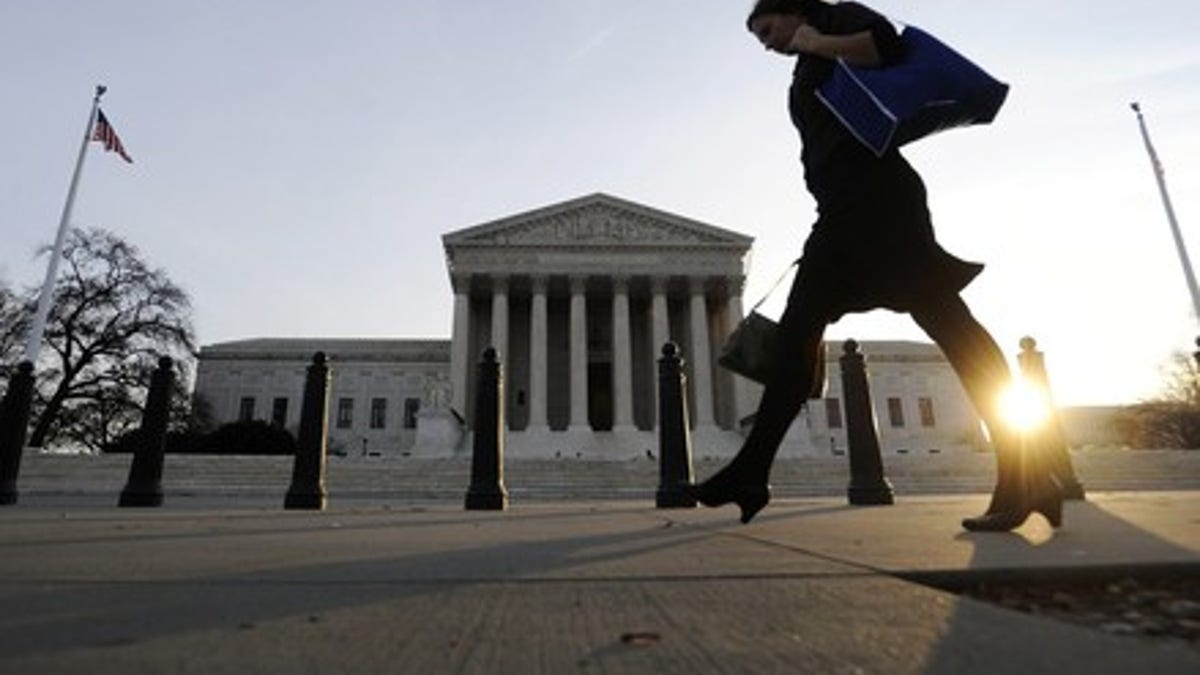
FILE -- A pedestrian walks past the US Supreme Court building in Washington. (REUTERS)
Fourteen years ago my then-colleague at George Mason Law School Larry Ribstein and I suggested a compromise over gay marriage. Back then we were a little ahead of our time but now our proposal is very timely indeed. What we suggested is that the question of gay marriage be relegated to the states and that such a marriage contracted in one state be recognized as valid in every state under the Full Faith and Credit clause of the Constitution.
The article was “Calling a Truce in the Marriage Wars,” (2001) U. Illinois Law Review 561, and its message is one which Justice Kennedy should take to heart, as he considers how to rule in Obergefell v. Hodges, the gay marriage case now before the Supreme Court.
Apart from offering a compromise, our proposal has three things more going for it. First, it respects the principle of federalism, and allows different states to go their own way on the issue.
In America people agree on a lot of things, but we also disagree on some things too, and gay marriage is one of them. Federalizing the issue would therefore permit people to sort themselves out by location. There’s no point trying to enforce the morals of Lynchburg, Virginia on San Francisco, or vice versa. And while Virginians may or may not be harmed by gay marriages in our state, it’s hard to see how we are harmed by gay marriages in California. The conservative Virginian might object to recognizing an out-of-state gay marriage, but he already lost that fight in 2013 when the Supreme Court struck down the Defense of Marriage Act in U.S. v. Windsor.
Second, our proposal is a prudential response to an issue whose consequences remain hidden from view. It’s not just about wedding certificates, after all. Rather, the larger question involves a broad range of social issues, such as adoption, tax and welfare policies, which until now have all been wrapped up in a single package. Can the Supreme Court, in deciding a question about marriage licenses, really claim to have studied all of these other issues? Even now, we’ve seen an intolerant gay community driving small businesses into ruin because their owners have religious scruples about gay marriage, and it is increasingly clear that we should expect further attacks on the First Amendment’s free exercise rights.
Justice Kennedy has to ask himself if he really wants to take a whack at that hornet’s nest. An absolute right to gay marriage would embolden the anti-clerical left and far from putting an end to the culture wars, it would raise them to levels never before seen in America.
Finally, we should be very careful about creating national rights that intrude on the deepest beliefs of many—apparently most—Americans. Unlike other countries, we’re not defined as a people by a common culture or religion. Instead, what makes us American is our commitment to the set of ideals and principles of government seen in the Declaration of Independence and the Constitution. They are constitutive of American identity, and to be on the wrong side of a constitutional right is to be something less than American.
You can be on the wrong side of Dodd-Frank or ObamaCare, and that doesn’t make you un-American, but it’s different when you’re on the wrong side of the Bill of Rights. You’re being told that not only have you lost a debate, not only are you deemed a bigot, but we’re not quite sure if you even belong here.
Justice Kennedy famously cares about questions of dignity, about the psychic pain felt by people who are not respected. He should therefore think twice before he decides that most Americans are second-class citizens.
Nothing threatens our sense of American identity, of a common American citizenship, more than a partisan desire for total victory in a cultural war, unless it is a Supreme Court that rules on the question without reflecting on all of the consequences of its decision.
F.H. Buckley is a Foundation Professor at George Mason Law School. His most recent book is The Once and Future King: The Rise of Crown Government in America (Encounter, 2014 and 2015).
